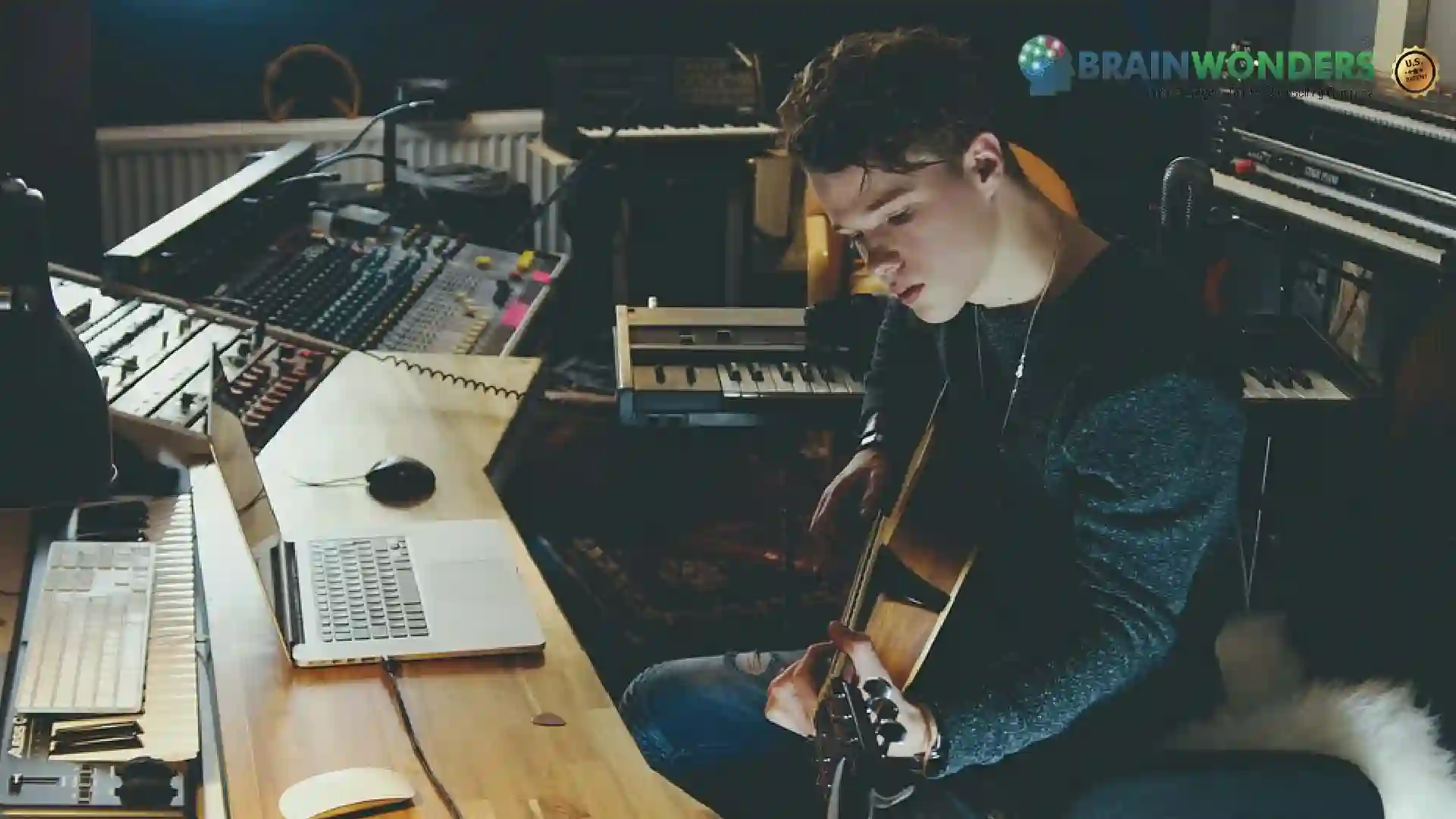How to become a Lyricist
Overview, Courses, Exam, Colleges, Pathways, Salary

Overview
Who is Lyricist ?
A lyricist is someone who crafts the creative words that are used in songs entertainment, artistic, or commercial purposes lyricists require some formal, a bachelor's degree in music theory or another related subject may be beneficial. A successful lyrics writer will work with a musical composer who can give feedback on how the written lyrics will work in conjunction with the music. A lyricist writes the words to a song, also writes the music, this is an advantage as they can control both the aspects of the song, which gives them artistic feeling that they were aiming for.
Typical day at work
What does Lyricist do?
The roles and responsibilities of lyricist includes:
- To understand the audience, song specifications and genre you are writing lyrics for.
- To listen proposed melodies to determine the mood, style, tone of the song before writing.
- To collaborate with musicians,composers, singers, artists, and various other professionals.
- To attend events and festivals where you can network with other writers and artists
- Advising, training, and mentoring junior Lyricists.
Abilities and Aptitude needed
What are the skills, abilities & aptitude needed to become Lyricist?
To become a lyricist, the aspirants must need to develop certain skills like an excellent understanding of language, style and structure, poetic voice. Lyricist must pose diverse writing portfolio and good presentation skills, must have the ability to simplify lengthy stories and to modify them in song lyrics, Lyricist research the subject’s matter and work on it extensively, must have the ability to think uniquely to develop content and must also have creative thinking skills which will make his lyrics unique from others.
To become a Lyricist, an aspirant must acquire skills like Writing talent, originality, ability to work independently and self-promotion abilities. Any self-driven individual wanting to pursue a career as a Lyricist should have an interest in writing. The individual should have creative thinking and out of the box imagination. The individual must also have good communication and writing skills.
Salary
Salary for Lyricist?
The salary of lyricist is as follows :
- Minimum Monthly Income: Aspiring Lyricists in India may begin their careers with a minimum monthly income of approximately INR 10,000 to INR 20,000. These entry-level lyricists often start by contributing lyrics for smaller projects or collaborating with emerging artists.
- Maximum Monthly Income: Experienced and established Lyricists, particularly those who have built a reputation and have worked on successful songs for well-known artists or major projects, can earn a maximum monthly income ranging from INR 50,000 to INR 1,00,000 or more.
- Annual Income: The annual income of a Lyricist varies widely depending on factors such as the number of projects undertaken, the popularity of the songs, royalties earned, and the ability to create impactful and memorable lyrics consistently. Established Lyricists who consistently contribute lyrics to hit songs and maintain a steady flow of work may earn an annual income ranging from INR 2,40,000 to INR 12,00,000 or higher.
- Highest Earning Opportunities and Scope: Lyricists who excel in crafting lyrics that resonate with a broad audience and can capture emotions and stories in their words often enjoy higher earning potential. Collaborating with renowned music composers and established singers and working on projects for popular films, albums, or commercial advertisements can increase income. The scope for Lyricists is promising, as music remains an integral part of culture and entertainment. With the diverse platforms available for sharing music, including streaming services, social media, and digital platforms, skilled Lyricists can reach a global audience and significantly impact the music industry.
Pathways
How to become an Lyricist?
Entrance Exam
Entrance Exam for Lyricist ?
There is no as such common entrance exam conducted at state or national level. The admission to educational institutes will based on merit list obtained in 10+2 level. Some universities/colleges conduct their own subjective entrance exam and interview.
Courses
Which course I can pursue?
Best Colleges
Which are the best colleges to attend to become an Lyricist?
Industries
Which Industries are open for Lyricist?
A lyricist has the creative ability to craft impactful and emotive words that enhance music and storytelling. Lyricists can find opportunities in various industries where their skills in writing and storytelling are valued. Some of the industries open for lyricists include:
- Music Industry: The most obvious industry for lyricists is the music industry itself. Lyricists collaborate with musicians, composers, and artists to create song lyrics for various genres, including pop, rock, hip-hop, country, and more.
- Film and Television: Lyricists can write songs and theme music for movies, TV shows, commercials, and other visual media. They contribute to soundtracks, create pieces that evoke specific emotions, and enhance storytelling.
- Theatre and Musical Theater: Lyricists are essential for creating the lyrics of songs in musical theatre productions, contributing to character development, plot advancement, and emotional resonance.
- Advertising and Marketing: Lyricists can work with advertising agencies to create catchy and memorable jingles or lyrics for commercials and marketing campaigns.
- Gaming Industry: Video games often feature original music and songs. Lyricists can contribute lyrics for in-game music, character themes, and other audio elements.
- Online Content Creation: Lyricists can create original songs for YouTube channels, podcasts, social media content, and other platforms.
- Content Creation Platforms: Lyricists can sell their lyrics on platforms that connect songwriters with artists and musicians seeking original content.
- Publishing: Lyricists can write poetry, create song lyrics, or contribute to anthologies, books, and literary publications.
- Education: Lyricists passionate about teaching can work in educational settings, teaching songwriting, creative writing, or music-related courses.
- Event Production and Entertainment: Lyricists can contribute to live performances, concerts, festivals, and events, creating original songs or adapting existing material.
- Non-Profit and Social Causes: Lyricists can collaborate with non-profit organizations to create songs that raise awareness and advocate for social and humanitarian causes.
- Collaborative Projects: Lyricists can collaborate with visual artists, poets, writers, and musicians on interdisciplinary projects that combine different forms of artistic expression.
- Personal Branding and Influencer Content: Lyricists can create original songs or jingles for personal branding, influencer marketing, and content creation on platforms like TikTok or Instagram.
- Media and Journalism: Lyricists can write music reviews, profiles, or articles related to the music industry for newspapers, magazines, blogs, and online publications.
- Cultural and Heritage Organizations: Lyricists can contribute to projects celebrating cultural heritage, traditions, and storytelling through music and lyrics.
internship
Are there internships available for Lyricist?
Internship opportunities for aspiring lyricists can provide valuable experience and insights into the music industry and the craft of songwriting. Here are potential places where you might find internships as a lyricist:
- Music Publishing Companies: Interning at music publishing companies allows you to work closely with songwriters, artists, and music executives. You might assist in reviewing lyrics, providing creative input, and learning about the business side of music.
- Recording Studios: Interning at recording studios exposes you to the process of creating music. You could collaborate with artists and songwriters, observe recording sessions, and refine your lyric-writing skills.
- Record Labels: Some record labels offer internships that involve working with songwriters, artists, and creative teams. You might have the opportunity to contribute lyrics to projects and learn about music production.
- Songwriting Workshops and Retreats: Participating in songwriting workshops or retreats as an intern can provide you with hands-on experience in a creative and collaborative environment.
- Music Festivals and Events: Interning at music festivals or industry events could allow you to connect with songwriters, artists, and industry professionals while gaining exposure to different genres and styles of music.
- Online Music Platforms: Some digital music platforms offer internships where you can contribute lyrics to online music projects, collaborate remotely with other artists, and gain exposure to the online music community.
- Media Companies: Interning at media companies that produce content related to music, such as music magazines, websites, or blogs, can provide opportunities to write about music and lyrics.
- Songwriting Organizations: There are organizations dedicated to supporting and promoting songwriters. Interning with such organizations could involve assisting with events, workshops, and outreach programs.
- Educational Institutions: Some universities and colleges offer internships within their music departments or creative writing programs. You might assist with teaching or organizing events related to songwriting.
- Film and Television Industry: Interning in the film or television industry allows you to learn about writing lyrics for visual media, such as soundtracks, commercials, or movie scenes.
- Community Arts Programs: Non-profit organizations and community arts programs often have internships that involve working with local artists, musicians, and writers to create and promote original music.
- Artist Management Companies: Interning at artist management firms can give you insight into the business aspects of songwriting and music promotion.
Career outlook
What does the future look like for Lyricist?
A career as a lyricist with a professional having outstanding skills can earn high and attractive salary packages as well. They have perks to enjoy flexible working hours and the desired (though productive) nature of work. Freelance lyricist also has the potential to make an excellent income, they create music professionally for the ones who pay them a substantial amount of money per song. Freelancers are not full-time employees for one specific company, so they are usually responsible for paying for their health insurance and working vacations, and sick time around client needs. The lyricist who works for a record label often receives all the perks and benefits through their employer only. It is a very creative career though requiring a good amount of practice and skill-based knowledge.
.webp)
.webp)

